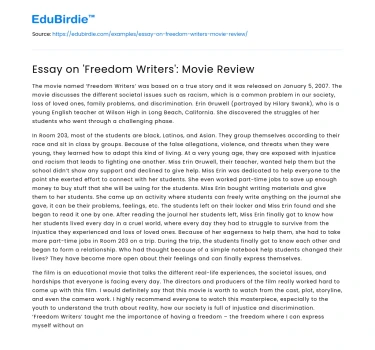Introduction
"Freedom Writers," directed by Richard LaGravenese, is a poignant film that delves into the complex realities of racial tensions and educational inequality in America. Released in 2007, the movie is based on the true story of Erin Gruwell, a determined teacher who transforms the lives of her at-risk students through unconventional teaching methods. Set in the volatile environment of a Long Beach high school, the narrative explores themes of perseverance, empathy, and empowerment. This essay aims to dissect the film's impact on audiences, its portrayal of socio-economic challenges, and its broader implications on educational reform. By examining the film's narrative structure, character development, and underlying messages, we can better understand its enduring relevance in discussions about systemic change in education.
Exploring Educational Challenges and Social Dynamics
"Freedom Writers" illuminates the multifaceted challenges faced by both educators and students in underprivileged settings. The film opens with Erin Gruwell, played by Hilary Swank, stepping into a classroom rife with racial divisions and gang affiliations. Her students, marginalized by society and written off by the educational system, struggle with issues far beyond the confines of academia. Gruwell's initial attempts to connect with her students are met with hostility and apathy, reflecting the deep-seated mistrust between the institution and the youth it purports to serve. According to educational theorist Paulo Freire, such an environment fosters a "banking model" of education, where students are passive recipients rather than active participants ("Pedagogy of the Oppressed").
Save your time!
We can take care of your essay
- Proper editing and formatting
- Free revision, title page, and bibliography
- Flexible prices and money-back guarantee
Gruwell's breakthrough comes when she encourages her students to write about their personal experiences, drawing parallels between their lives and historical events like the Holocaust. This pedagogical shift transforms the classroom into a safe space for dialogue and self-expression. As students begin to share their narratives, they not only learn empathy but also develop a sense of agency. The film adeptly illustrates how culturally responsive teaching can bridge divides and foster a more inclusive learning environment. However, some critics argue that Gruwell's approach, while effective, may oversimplify the systemic issues at play. As education scholar Gloria Ladson-Billings points out, true educational reform requires structural changes beyond individual classrooms ("The Dreamkeepers").
Character Development and Narrative Techniques
A significant strength of "Freedom Writers" lies in its character development and narrative techniques, which together create a compelling and immersive story. Each student's journey from alienation to empowerment is depicted with nuance and sensitivity. The use of diary entries as a narrative device allows viewers to engage with the students' inner thoughts and struggles, adding depth to their transformation. For instance, the character of Eva, portrayed by April Lee Hernandez, evolves from a hardened gang member to a conscientious individual who questions her preconceived notions of loyalty and justice.
The film also employs visual storytelling to emphasize the stark contrast between the students' turbulent home lives and the sanctuary of the classroom. Cinematographer Jim Denault's use of lighting and composition mirrors the characters' emotional states, subtly highlighting moments of hope and despair. These artistic choices enhance the film's emotional resonance, making the audience more invested in the characters' outcomes. Yet, it is crucial to acknowledge that the film's narrative arc, which focuses on a white savior figure, can be problematic. Critics like bell hooks have argued that such portrayals risk overshadowing the agency and resilience of marginalized communities themselves ("Teaching to Transgress").
Implications and Broader Impact on Educational Reform
"Freedom Writers" serves as a catalyst for discussions about the broader implications of educational reform. By spotlighting the transformative power of education, the film encourages audiences to consider the role of educators as change agents within their communities. The success of Gruwell's methods suggests that fostering critical thinking and emotional intelligence can yield profound results, even in the most challenging circumstances. This aligns with the principles of critical pedagogy, which advocate for education as a practice of freedom and empowerment ("Pedagogy of the Oppressed").
However, while the film inspires hope, it also underscores the systemic barriers that persist in real-world educational settings. The lack of institutional support Gruwell faces highlights the need for comprehensive policies that address funding disparities, teacher training, and curriculum development. Furthermore, the film implicitly challenges viewers to reflect on their own biases and assumptions about students from diverse backgrounds. As education reform continues to evolve, "Freedom Writers" remains a powerful reminder of the potential for change when educators and students collaborate to redefine the boundaries of learning.
Conclusion
In conclusion, "Freedom Writers" is a cinematic exploration of the transformative potential of education in the face of adversity. Through its compelling narrative and well-developed characters, the film offers valuable insights into the social dynamics that shape educational experiences. While it presents an optimistic view of change, it simultaneously calls attention to the systemic challenges that educators and students must navigate. As a cultural artifact, the film continues to resonate with audiences, inspiring conversations about the need for holistic and inclusive approaches to education. Ultimately, "Freedom Writers" invites us to reimagine the possibilities of teaching and learning, urging us to strive for a more equitable and empathetic world.






 Stuck on your essay?
Stuck on your essay?

